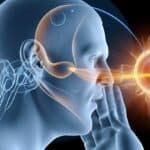The Dual Challenge: Exploring the Causes Behind Dizziness and Tinnitus
- Get link
- X
- Other Apps
Table Of Contents
Introduction
Have you ever felt like the world is spinning around you, felt an unsteadiness in your body, or as though you might faint? This feeling of imbalance is referred to as dizziness. Now imagine if a constant hum, buzz, or hissing sound accompanied that feeling? That would be tinnitus. On their own, both dizziness and tinnitus can be irritating, but did you know they could occur together? That’s right, these two sensations often go hand-in-hand, especially under certain health scenarios.
The Science Behind Dizziness
Dizziness might seem like a simple condition, but there’s an entire scientific backstory to it. It all commences within our body, particularly in the ears and the brain.
The Science Behind Dizziness uncovers that our inner ear plays a vital role. It comprises a complex arrangement of canals filled with fluid. Any movement in this fluid is detected by your brain, helping it understand your body’s position and balance – pretty cool, right? An issue in this arrangement can often lead to dizziness.
Apart from internal factors, certain external triggers like stress, dehydration, low blood sugar, or major shifts in your environment can also induce a dizzy comeback!
What Does Tinnitus Sound Like
If you live with tinnitus, you might feel like there’s a concert held, but only inside your ears. It’s a sensation of hearing sounds even in the absence of any external noise. But what does tinnitus sound like?
According to What Tinnitus Sounds Like, the typical tinnitus experience involves hearing sounds similar to a constant ringing, buzzing, roaring, hissing, or clicking. It might be an occasional annoyance for some, or a continuous obstacle for others. This mysterious concert can be conducted by various characters, such as exposure to loud noise, ear injuries, or an underlying condition like blood pressure or age-related hearing loss.
The melody of tinnitus can get louder when you’re under stress or when the surrounding environment is quiet. Understanding what contributes to tinnitus and finding ways to manage it can pave the path to a chorus of relief and comfort.
Exploring the Relationship Between Dizziness and Tinnitus
Ever thought about the ties between hearing buzzing sounds in your ear and feeling like you’re aboard a ship on a stormy sea? From afar, they might seem unrelated but look closer, and you’ll find an intriguing relationship between tinnitus and dizziness. A tumultuous symphony directed by tinnitus, complete with crescendos of dizziness, can play havoc with your daily life. Let’s delve deeper to understand this dynamic duo.
Can Tinnitus Cause Dizziness And Nausea?
Tinnitus, best known for its thrilling concert in your ears, also has some side gigs – and causing dizziness and nausea is one of them. Sounds surprising? It did to us as well! Can Tinnitus Cause Dizziness and Nausea answers this question with a comprehensive look into the symbiosis of these symptoms.
In certain cases, tinnitus could induce vertigo, which could spin you around with a sense of imbalance and further lead to a feeling of sickness or nausea. Conditions like Meniere’s disease encompass symptoms of chronic tinnitus, sporadic bouts of dizziness, and even hearing loss. Here, Tinnitus isn’t just the sound technician but the conductor of the entire performance.
Does Tinnitus Make You Dizzy?
- A buzzing sound in your ears
- A spinning sensation
- Connections between the two?
Oh yes, there are! Does Tinnitus Make You Dizzy unfolds the various associations of how tinnitus plays a key role in creating a whirlpool of dizziness. It may not be a direct cause-and-effect relationship, but tinnitus can certainly contribute to a feeling of unsteadiness or imbalance. Our intricate ear structure that helps maintain our balance may get disrupted due to tinnitus, breaking our equilibrium. So, in some cases, that constant drone in your ear could very well be making you dizzy.
Remember, understanding this relationship is the first step towards handling these conditions better. A symphony should not be synonymous with discomfort, and with the right steps, you can retune the harmony of your health.
Understanding The Causes of Concurrent Dizziness and Tinnitus
Being dizzy and hearing an incessant hum within our ears is no fun, and what contributes to this taxing duo requires our attention. The unique pairing of these symptoms is often an unfortunate ticket to a rollercoaster ride of discomfort and disruption. But what’s behind the curtain of this disorienting performance?
What Can Cause Tinnitus And Dizziness
Finding the root cause of a problem is the first step towards resolution. This statement wholly applies to solving the mystery of concurrent dizziness and tinnitus. Not always an evident cause-and-effect relationship, it can often be an intertwined web of triggers and conditions. So let’s untangle the web, shall we?
Unveiled in What Can Cause Tinnitus and Dizziness, are a comprehensive list of potential culprits behind this unnerving dance. Here are some of them:
- Meniere’s Disease: An inner ear disorder that can cause episodes of vertigo, tinnitus and hearing loss.
- Acoustic Neuroma: A benign brain tumor that can cause varying degrees of hearing loss, tinnitus, and dizziness.
- Labyrinthitis or Vestibular Neuritis: Inflammation of the inner ear leading to dizziness and loss of balance, with tinnitus being a common symptom.
- Migraines: Severe headaches that may cause vertigo and tinnitus.
- Trauma: Injuries to the head or neck can result in tinnitus and dizziness.
- Certain Medications: Several drugs list dizziness and tinnitus as side effects.
It’s imperative to understand that these are just possibilities, and the true cause can only be identified by a medical professional. Our complex body system weaves quite a fascinating story, but it’s our responsibility to listen and read between the lines. Remember, your health is your greatest asset and understanding it, your greatest weapon.
Proper Handling and Treatment for Dizziness and Tinnitus
Knowing how discombobulating the pair of dizziness and tinnitus can be, the quest for effective management strategies and treatments becomes crucial. As peculiar and challenging as the symptoms may be, there are ways of navigating through this labyrinth and finding respite. The journey might be strenuous, but with a proper plan and perseverance, these daunting foes of balance and silence can be tamed.
A key perspective to consider while handling these symptoms is that dizziness and tinnitus are often symptoms and not standalone conditions. Therefore, treating the underlying cause usually brings relief.
Therapies like cognitive-behavioral therapy, sound therapy, and even simple lifestyle adjustments can make a significant difference. Tinnitus Cognitive Behavioral Therapy provides a deep dive into how your mind can be an effective tool in dealing with tinnitus-induced stress and anxiety. And there’s more; the article “Sleep And Tinnitus” accentuates the value of sound sleep in managing tinnitus.
Good Tinnitus Success Stories
Often what provides the loudest echo of hope is not just the scientific backing of treatments but the real-life experiences people share. The article “Good Tinnitus Success Stories” serves a plateful of motivation and positivity with stories of people who have successfully managed tinnitus and dizziness. Their triumphing efforts shine a light on the tunnel we might find ourselves in and remind us that there’s a way out.
Conclusion
Unraveling the world of dizziness and tinnitus can surely feel like treading unknown territory. Their tricky relationship, the dizzying array of causes, and the effort it takes to navigate their management is not an easy path, but the relief and comfort at the end of it are worth it. Common Conditions That Cause Dizziness and Tinnitus clarifies that both these symptoms can be the manifestations of more significant health conditions. Therefore, it’s crucial not to ignore them but reach out for medical help to understand their true cause and appropriate management. Remember, every note of discomfort has its underlying beat, and finding it is your pathway to harmony.
Dizziness And Tinnitus Causes - Frequently Asked Questions (FAQ)
Both tinnitus and dizziness can be caused by various health conditions. It could be an ear infection, Meniere’s disease, or an acoustic neuroma. It could also be due to medications, trauma or general health conditions such as blood pressure or migraines.
Yes, tinnitus can sometimes make you feel dizzy. Because our inner ear is involved in both hearing and balance, disruptions such as those caused by tinnitus can affect our equilibrium, leading to feelings of unsteadiness or dizziness.
In some cases, treating tinnitus can help with the dizziness. If the tinnitus and dizziness are both symptoms of the same underlying condition, treating that condition can alleviate both symptoms.
While it’s possible to experience dizziness and tinnitus together, it’s not especially common. The combination of these two symptoms often suggests an underlying condition that affects the inner ear or the nervous system.
Managing dizziness and tinnitus involves a combination of medication, therapy (like cognitive behavioral therapy), lifestyle changes, and, in some cases, surgery. However, the specific treatment plan depends on the underlying cause of these symptoms.
The post The Dual Challenge: Exploring the Causes Behind Dizziness and Tinnitus appeared first on Pulsatile Tinnitus Treatments News - Tinnitus Relief.
Related posts:
https://ift.tt/LqDziZS
#tinnitus #pusatiletinnitus #earringing #whatistinnitus #howtostoptinnitus
- Get link
- X
- Other Apps



Comments
Post a Comment